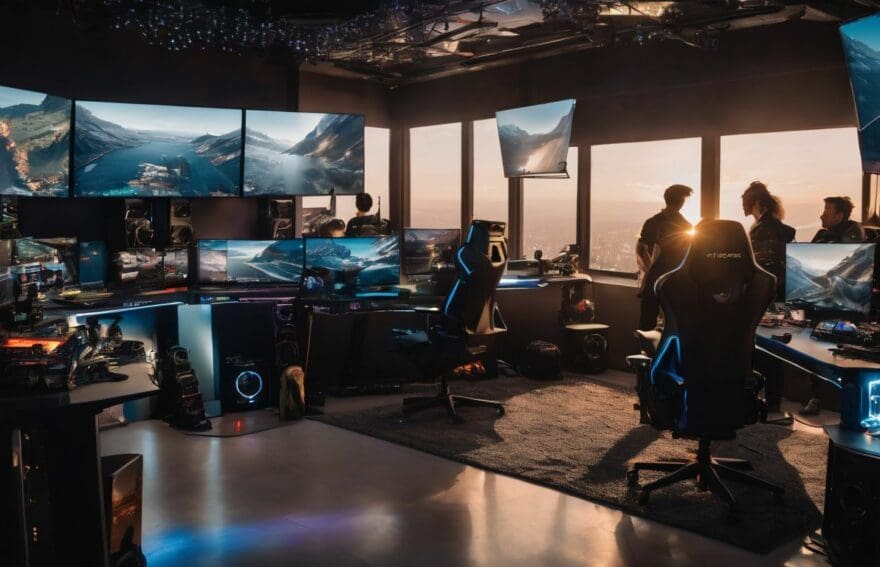Career Longevity in Esports: Staying Relevant in a Fast-Paced Industry

Updated On: October 24, 2025 by James Connolly
Embarking on a career in esports can be as exhilarating as it is ephemeral, with the pace at which this electrifying world moves. Much like yourself, we’ve observed the hurdles that come with sustaining a lasting foothold in such a mercurial field.
Our research has unearthed some telling insights; notably, that the twilight years for most competitive gamers loom around their late twenties. Through our forthcoming blog posts, we’re keen to show you how to buck this trend and revitalise your professional gaming tenure.
Expect practical tips on stretching out those glory days and thoughtful advice on navigating life after the leaderboards. Let’s dive into strategies for keeping your A-game up and running well into the future.
The Fast-Paced World of Esports
In the world of esports, every millisecond counts. We witness players making split-second decisions that can win prestigious tournaments or cost them a match. This electrifying environment is what draws many of us to compete and watch.
Games evolve quickly, with new strategies emerging all the time, which means we must constantly adapt to stay ahead.
Maintaining peak performance gets tougher as reflexes might slow down slightly with age. For esports athletes, this challenge is significant as their career spans typically last between five to ten years.
The rapid progression of games and relentless competition demand intense dedication – it’s an exhilarating ride that calls for mental resilience and a willingness to learn continuously.
Challenges for Esports Athletes
The fast-paced nature of the esports industry presents several challenges for athletes, including a relatively short career span and the physical and mental strain of constant competition.
These challenges can impact an athlete’s longevity in the industry and require careful management to ensure sustained success.
Short career span
Esports careers tend to be relatively short, with many professional gamers retiring after just five to 10 years in the industry. This can often be due to the demanding nature of competitive gaming and the physical and mental strain it places on players.
The fast-paced, reflex-reliant nature of esports creates challenges for athletes attempting to maintain peak performance as they age. Factors such as rapid game evolution, pressure from competition, and the demanding lifestyle contribute to an early retirement age for many esports players.
The average career length for an esports athlete is influenced by a variety of factors including game popularity, individual skill level, and team success. Despite the short career span, the growing industry provides opportunities beyond playing professionally, ranging from coaching positions to content creation and streaming roles within esports organisations.
Physical and mental strain
The demanding nature of professional gaming can lead to significant physical and mental strain on players. The pressure to perform at a high level constantly, the long hours of practice, and the stress of competition can take a toll on both the mind and body.
Many eSports athletes experience burnout from overtraining and face challenges in maintaining their mental well-being.
To stay relevant in this fast-paced industry, it’s crucial for gamers to prioritise their physical health as much as their gaming skills. Proper training techniques, regular exercise, healthy eating habits, and sufficient rest are essential for combating the physical strain associated with an eSports career.
The Future of Esports Careers
The future of esports careers holds a diverse range of opportunities for athletes, with potential for long-term success and growth within the industry. As the esports sector continues to expand, there are various career paths and roles that players can explore beyond competitive gaming, ensuring sustainability in their professional journey.
Diverse range of opportunities
The esports industry offers a diverse range of career opportunities beyond professional gaming. Players can transition into roles such as coaching, content creation, streaming, and event organisation after retiring from competitive play.
These alternative paths enable individuals to continue contributing to the industry while leveraging their expertise and experience gained from their time as players.
Aside from direct involvement in gaming, there are openings in areas such as marketing, management, and event production within the rapidly expanding esports sector. Additionally, the rise of collegiate esports programmes has created opportunities for those interested in pursuing careers related to education and skill development in gaming.
Potential for long-term success
Esports careers offer the potential for long-term success beyond playing professionally. With the industry’s rapid growth, opportunities abound in coaching, content creation, streaming, and various other roles.
Transferable skills gained from competitive gaming, such as adaptability and strategic thinking, can open doors to diverse career paths within the esports industry. Moreover, with government recognition and support increasing, professional gamers have access to scholarships and resources that enhance their life skills and enable them to sustain successful careers over the long term.
The lifespan of an eSports career is often tied to the popularity and longevity of the game being played; hence diversifying into other avenues within the industry further extends one’s professional gaming career length.
Transitioning from Esports to Other Professions
After retiring from an esports career, players can leverage their transferable skills such as strategic thinking, teamwork, and problem-solving to transition into other professions.
However, they may also face challenges in adapting to new work environments and finding opportunities outside of the gaming industry.
Transferable skills
Esports athletes possess a variety of transferable skills that can be leveraged in other professions. The strategic thinking, teamwork, and communication abilities honed in competitive gaming are highly sought after in the business world.
Additionally, the strong work ethic and resilience developed in professional gaming can translate into success across different career paths, from project management to marketing.
Moreover, the analytical mindset and quick decision-making required in esports competitions are valuable assets that can be applied to fields such as finance or technology. These transferable skills, combined with a proactive approach to learning new industries, enable former esports athletes to excel beyond their competitive gaming careers.
Challenges and opportunities
Meeting the challenges of an esports career involves acknowledging and addressing the physical and mental strain that comes with it. The demanding nature of competitive gaming can lead to burnout, affecting players’ overall well-being.
Balancing intense training regimes and competition pressure is vital for sustaining a long, successful career in esports. Moreover, recognising opportunities beyond playing professionally, such as coaching or content creation roles, offers avenues for extended involvement in the industry.
Transitioning from professional gaming to other professions presents both challenges and opportunities. Players possess valuable transferable skills like strategic thinking and teamwork that are sought after in various industries.
Recommendations for Ensuring Career Longevity
We can support esports athletes by providing proper training and rest to prevent burnout, as well as implementing support systems and resources to address mental health challenges.
Collaboration and regulation within the industry, along with government support and recognition, are also essential for ensuring career longevity in esports.
Proper training and rest
Maintaining career longevity in esports requires a balance between rigorous training and adequate rest. Players must engage in regular physical exercise and mental conditioning to improve their reflexes and decision-making skills.
Furthermore, prioritising sufficient rest periods is crucial to prevent burnout and sustain peak performance. Overtraining can lead to physical health issues and mental fatigue, negatively impacting an athlete’s ability to compete at the highest level.
To achieve sustained success in the fast-paced world of esports, a disciplined approach towards training and recovery is essential for players across all levels of expertise. By incorporating effective training methods along with ample resting periods, athletes can optimise their performance while mitigating potential long-term risks associated with overexertion.
Support systems and resources
Esports athletes benefit from strong support systems and resources to ensure their career longevity. Access to professional coaches, mental health professionals, and physical therapists can help players maintain optimal performance and manage the stress of competition.
Additionally, having a supportive network of family, friends, and peers can provide crucial emotional support during challenging times in an esports career.
Recognising the need for ongoing learning and development within the industry, access to educational opportunities such as online courses or workshops can help players acquire new skills beyond gaming.
These resources are vital in preparing esports athletes for successful transitions into other professions when they decide to retire from competitive play. Ultimately, establishing robust support systems and making resources readily available is essential for safeguarding the well-being and longevity of esports careers.
Collaboration and regulation within the industry
Creating a sustainable environment for esports careers requires collaboration and regulation within the industry. Establishing clear standards and guidelines can help protect players from burnout and injury, ensuring their long-term success.
Collaborative efforts between organisations, teams, and governing bodies are essential to create a safe and supportive ecosystem that promotes career longevity in esports. By working together, we can address the challenges faced by athletes while also fostering a thriving and sustainable industry that benefits everyone involved.
Government support and recognition
Government support and recognition are vital for the sustained growth of the esports industry. Establishing official recognition and regulation can help protect players from exploitation and ensure fair treatment within the industry.
Additionally, government support in the form of funding, grants, or scholarships can provide opportunities for aspiring gamers to receive proper training and education, contributing to a more sustainable career path.
Inclusion of esports in national sports programs can also help raise awareness about the positive impact of competitive gaming on mental agility and skill development, which could lead to increased societal legitimacy for esports as a profession.
Conclusion
In summary, career longevity in esports is a pressing concern as athletes face short career spans and physical strain. However, the industry offers diverse opportunities beyond playing professionally.
To ensure sustainability, proper training and rest are crucial, along with support systems and collaboration within the industry. Government recognition can also play a role in supporting the long-term success of esports careers.
FAQs
1. How can players achieve career longevity in esports?
Players can maintain career longevity in esports by staying updated with game knowledge, managing overtraining to avoid burnout, and balancing life with their competitive gaming careers.
2. What challenges do professional gamers face for a sustainable career?
Challenges of a professional gaming career include coping with the pressure to stay at the competitive edge, dealing with mental health impacts, and preparing for life after esports retirement age.
3. Are there opportunities beyond playing in the esports industry?
Yes! Career opportunities in the esports industry go beyond playing; individuals can transition to new careers such as coaching, management or content creation after retiring from active competition.
4. What’s the impact of overtraining on an esports player’s health?
Overtraining can lead to Esports player burnout and negatively impact mental health, reducing an individual’s ability to perform well and shortening their competitive gaming career path.
5. Can education play a role in an Esports player’s future outside of gaming?
Absolutely! Through Esports scholarships and learning life skills while training, players prepare themselves for transitioning out of esports into various other fields that support their interests and talents.








